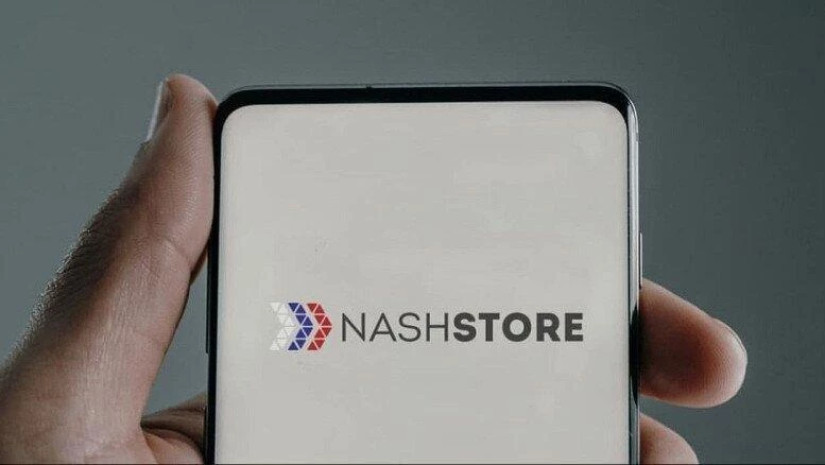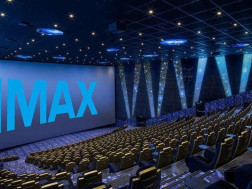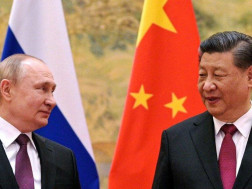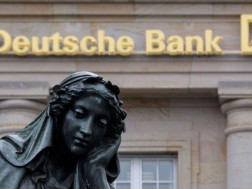For many Russian IT specialists, the fallout from the invasion of Ukraine heralded disaster. For others, it has been an opportunity.
Amid Western sanctions and a flood of Western companies exiting the Russian market, Prime Minister Mikhail Mishustin made an emotional appeal to the country’s IT community in April, urging them “not to fear anything,” stay in Russia and help to build a new sovereign internet.
Vladimir Zykov was one of those who answered the call.
“We heard Mishustin, and we did it," said Zykov, director of projects for IT firm Digital Platforms, who was behind the creation of NashStore, a self-styled Russian alternative to Google Play.
NashStore is one of a host of domestic tech analogues seeking to replace Western firms forced out of Russia by Kremlin bans or international sanctions.
Experts, however, are skeptical that domestic alternatives are viable in the long term — or whether Russia’s current IT sector can muster the know-how to create a “sovereign internet” that can operate on its own terms.
“It's just a bunch of bull**** propaganda,” said Mikhail Klimarev, the head of Russia’s Internet Protection Society, which is linked to opposition leader Alexei Navalny.
Other analogues that have been set up include RuTube, Russia’s answer to YouTube; Tamtam, a copy of messaging app Telegram; and Rossgram, an app that describes itself as Russia’s version of Instagram. All have experienced significant teething problems.
While Google Play still operates in Russia, Alphabet, which owns Google Play, suspended all payment-based services for its platforms in Russia — meaning Russian users have been unable to pay for apps since March. Apps for sanctioned Russian companies are also not available.
Mishustin ordered Russia's Ministry of Digital Development, Communication, and Mass Media to create a domestic equivalent of Google Play by June 1.
That, said Zykov, opened the door for NashStore (“Our Store”), which is described as “sanction-proof” on its website.
“Our goal is to make a multi-functional and convenient app store,” Zykov told The Moscow Times. “We’re at the very beginning. But you can already see that our platform is designed to be more modern than Google Play.”
NashStore was launched on May 9, a day of patriotic celebrations in Russia marking the Soviet Union’s victory over Nazi Germany.
Digital Platforms lists five government ministries among its partners, and Mishustin’s order means officials have been keen to see Google Play alternatives get off the ground.
But ties to the state also have drawbacks.
Just half an hour after its May launch, NashStore went offline amid a DDoS attack in which the company claimed more than million bots flooded its servers. Zykov said NashStore was targeted because of state support, but that he was grateful for the disruption — any publicity, he said, is good for business.
Perhaps more importantly, NashStore is facing competition from other Russian firms — also with state support — seeking to create a similar product.
An app store called RuMarket was opened in April and Russian internet giant VK launched RuStore the following month in conjunction with state-owned lender Sberbank, cybersecurity firm Kaspersky Lab and tech giant Yandex.
With the involvement of major Russian companies, RuStore appears likely to be chosen by the government as the official Russian alternative to Google Play.
Zykov said that the Ministry of Digital Development, Communication, and Mass Media ditched NashStore in favor of its VK rival without any warning.
“It’s an unpleasant story, I don’t understand why they did it,” he said.
The government introduced legislation to the State Duma earlier this month that would mandate the creation of a Russian app store and oblige it to be installed on all smartphones and other electronic devices.
The legislation was fast tracked as an amendment to a new bill on data protection, and will likely be passed into law in the coming weeks.
But even if tech companies can secure state support, they do not necessarily have the know-how to successfully bring products to market — at least not quickly.
Instagram replacement Rossgram was founded after Russia’s media censor, Roskomnadzor, blocked access to the U.S.-based company in March — but the app still hasn’t launched.
RuStore remains in beta testing and is not expected to launch fully until toward the end of the year, according to VK head Vladimir Kiriyenko.
On NashStore’s opening day, users were told to download the app via Yandex Disk, a cloud sharing platform, but the company’s developers did not purchase a business account from Yandex — meaning downloads were capped at 1,000 and hundreds of potential customers were unable to access the software.
Even those who managed to sign up found their choices limited.
While Apple’s App Store has 4 million apps and Google Play has 2,5 million, the number of apps on NashStore is closer to 1,000. RuStore has even fewer.
There are just a handful of foreign apps on either RuStore and NashStore, and there is no way to download social networks including Twitter, Instagram and Facebook that are deemed extremist in Russia. The limited selection of foreign apps on NashStore include Singapore’s Likee app and the U.S.-produced Folder Player.
“The issues for foreign developers are a little more profound because they need to register in Russia and do a number of things,” Zykov said, referring to legal requirements to store user data on Russia-based servers.
Significantly, alternatives like NashStore are only available on Android devices as it is too difficult to load software unauthorized by Apple onto iPhones. NashStore asked the Russian parliament in April to pressure Apple into allowing such sideloads on their smartphones, but no legislation was forthcoming.
Neither is NashStore’s future secure on Android phones.
Google’s latest Android 13 operating system, which is due for release this summer, is expected to crack down on unauthorized software.
In fact, in order to function properly, expert Klimarev said that Russia’s digital analogues may find it necessary to produce every component of its digital infrastructure independently, from microchips to operating systems.
“To recreate Google Play, you’d need an integration with the Android operating system,” he said. “Everything else would be a pitiful imitation,” Moscow Times reports.
















